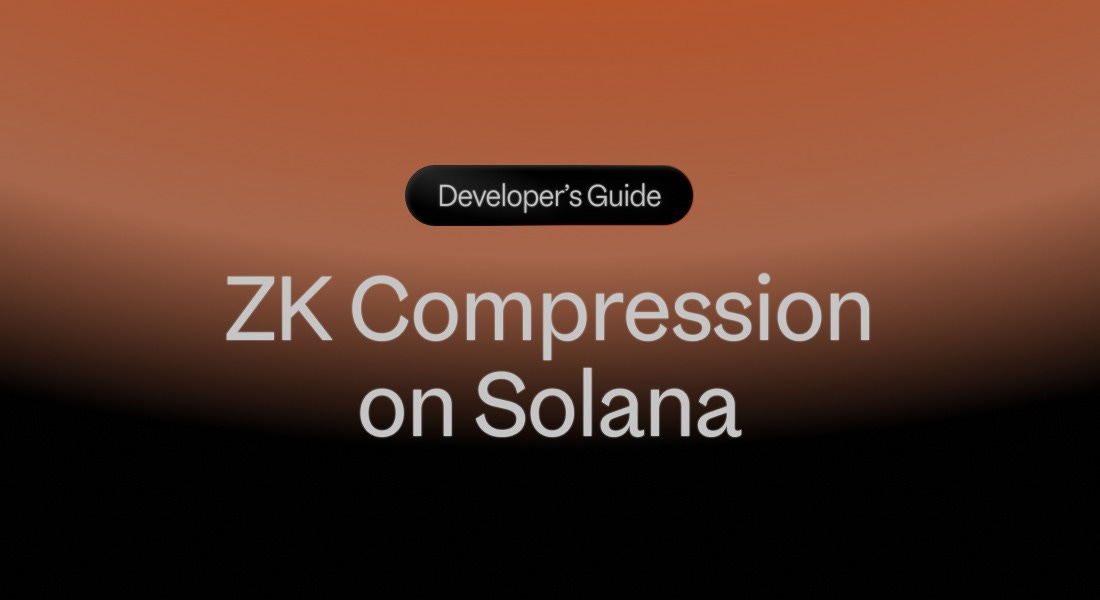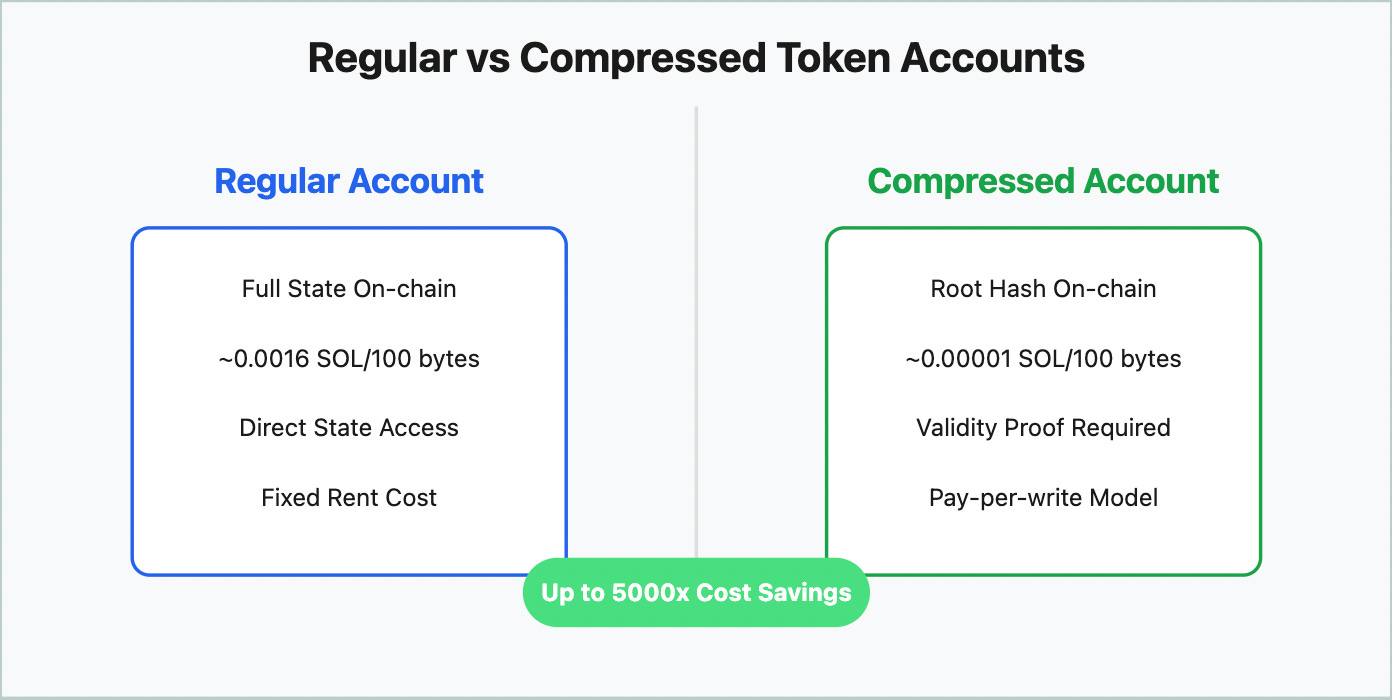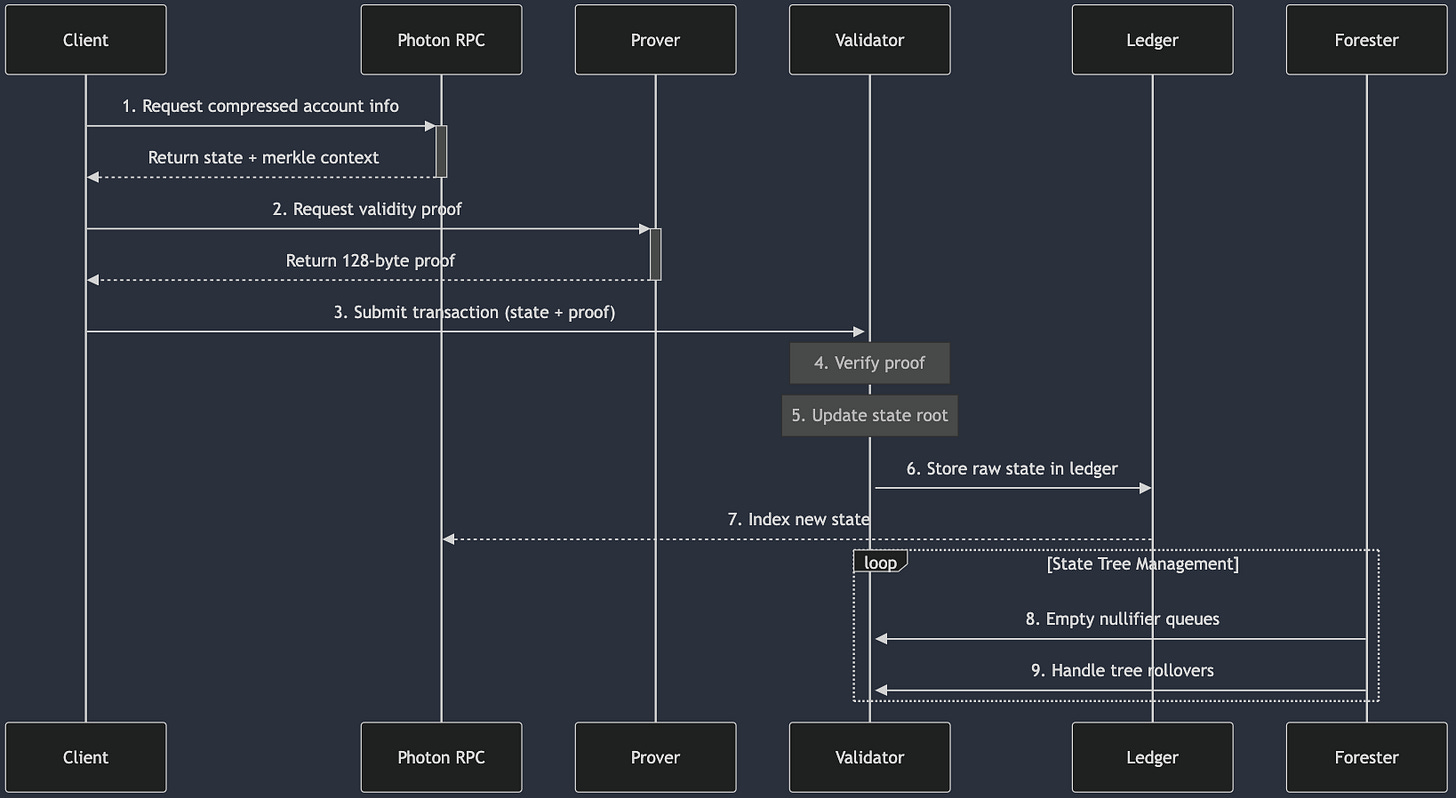Solana's rapid growth has brought both opportunities and challenges, with state storage costs becoming a significant barrier for applications aiming to scale. With over 500 million accounts and roughly 1 million new accounts added daily, developers need efficient solutions for managing state growth. ZK Compression elegantly solves this by reducing state costs up to 5000x while preserving Solana's core security and composability guarantees.
In this comprehensive guide, we'll explore:
How ZK Compression solves Solana's state growth challenges
The technical architecture behind compressed accounts and state trees
Practical examples of building with compressed accounts
Best practices and limitations for production deployment
This article assumes knowledge of Solana’s Account model and basics of zero knowledge proofs.
Key Benefits
ZK Compression reduces state costs by up to 5000x by storing data on Solana's cheaper ledger space
Integration requires minimal changes to existing Solana development practices
Supports atomic composability with regular Solana accounts and programs
Ideal for applications needing many small accounts (tokens, game items, etc.)
Use compressed tokens today with existing DeFi protocols through atomic decompress/compress operations
Table of Contents
Understanding the State Growth Problem
Introduction to ZK Compression
Technical Architecture
Project Tutorials
Compressed Token Launch
Jupiter Integration
Compressed Blog dApp
Best Practices & Limitations
Conclusion & Additional Resources
Understanding the State Growth Problem
The Solana network faces increasing pressure on its state storage capacity. Let's break down the economics of traditional state storage:
// Traditional token account costs (at $150/SOL)
const traditionalCosts = {
singleAccount: 0.00204428 SOL, // ~$0.30
thousandAccounts: 2.04428 SOL, // ~$300
millionAccounts: 2044.28 SOL, // ~$300,000
};This cost structure creates significant barriers for applications aiming to scale to millions of users. For example:
A social network with 1M users: $300,000 in state costs
A game with 100K players and 10 inventory slots each: $300,000
A DeFi protocol with 1M token accounts: $300,000
Introduction to ZK Compression
ZK Compression is a new primitive built on Solana that enables you to build applications at scale. Developers and users can opt to compress their on-chain state, reducing state costs by orders of magnitude while preserving the security, performance, and composability of the Solana L1. The system achieves 5000x cheaper state costs through three core components:
Compression: Only state roots (32-byte fingerprints of all compressed accounts) are stored in on-chain accounts. The underlying data is stored on the cheaper Solana ledger space instead of the more expensive account space.
ZK (Zero-Knowledge): The protocol uses small zero-knowledge proofs (validity proofs) to ensure the integrity of the compressed state. These proofs maintain a constant 128-byte size regardless of how many accounts are being updated, read, or written in a single transaction.
L1 Integration: Execution and data availability are both on Solana, preserving the performance and security guarantees of the L1. This is neither an L2 nor a validium - everything runs directly on Solana.
How ZK Compression Works
There are various working components which are working together, let’s learn about each component.
State Trees
The protocol stores compressed state in multiple state trees (a "forest" of trees). Each state tree:
Is a binary Merkle tree that contains compressed account hashes as leaves
Has a corresponding on-chain account storing only the final root hash and metadata
Enables efficient cryptographic verification of any leaf's validity using the on-chain root
Ensures each account hash is globally unique by including:
The state tree's public key (state tree hash)
The account's position (leafIndex)
The account's data hash
Compressed Account Model
Compressed accounts are similar to regular Solana accounts but with key differences:
Each compressed account can be identified by its hash
Each write to a compressed account changes its hash
An address can optionally be set as a permanent unique ID of the compressed account
All compressed accounts are stored in sparse state trees
Only the tree's state root is stored in the on-chain account space
The raw data is stored in the ledger as transaction logs
Other than the differences listed above, both the token accounts are similar. Compressed Token Accounts are exactly like regular SPL token accounts from a developer's perspective - they can be transferred, delegated, frozen, and maintain the same security properties. They fully implement the SPL token standard, making them a drop-in replacement that's cheaper and more scalable.
Validity Proofs
Uses Groth16, a renowned pairing-based zk-SNARK, for proof generation and verification
Proofs maintain a constant 128-byte size regardless of how many accounts are being updated, read, or written in a single transaction
Generated off-chain by Prover nodes and verified on-chain by the Light System Program
Reduces Solana's computational burden while ensuring security
Program Architecture
Light System Program (
SySTEM1eSU2p4BGQfQpimFEWWSC1XDFeun3Nqzz3rT7): Core program handling compression operations and proof verificationAccount Compression Program (
compr6CUsB5m2jS4Y3831ztGSTnDpnKJTKS95d64XVq): Implements state and address treesCompressed Token Program (
cTokenmWW8bLPjZEBAUgYy3zKxQZW6VKi7bqNFEVv3m): A compressed token implementation built using ZK Compression that enforces SPL-compatible token layoutAll programs operate atomically on Solana's L1
Supporting Infrastructure
Tracks and indexes compression programs
Provides read state via ZK Compression RPC API
Caches current state for quick access
Can be run locally or accessed through RPC providers
Maintain state roots
Empty nullifier queues asynchronously
Handle state tree management
Operate permissionlessly - developers can run their own nodes or use network nodes
Transaction Flow
Client Operations
Gets compressed account state and Merkle proof from Photon RPC
Obtains validity proof from Prover node
Submits transaction with account state and proof
On-chain Protocol Execution The Light System Program:
Runs checks (sum check, etc.)
Verifies the validity proof
Nullifies old state
Appends new account hash to state tree
Updates state root
Emits new state to Solana ledger
This architecture enables efficient state compression while maintaining security through ZK proofs and full composability with other Solana programs through atomic operations. Developers can seamlessly interact with both compressed and regular accounts within the same transaction.
Project Tutorials
Compressed Token Launch
Let's look at a practical example of creating and using compressed tokens. This code demonstrates the core operations:
import { Rpc, createRpc } from "@lightprotocol/stateless.js";
import { createMint, mintTo, transfer } from "@lightprotocol/compressed-token";
import { Keypair, PublicKey } from "@solana/web3.js";
import bs58 from "bs58";
import "dotenv/config";
// Initialize RPC connection
const RPC_ENDPOINT =
"https://mainnet.helius-rpc.com/?api-key=" + process.env.HELIUS_API_KEY;
const connection: Rpc = createRpc(RPC_ENDPOINT, RPC_ENDPOINT);
const USER_KEYPAIR = Keypair.fromSecretKey(
bs58.decode(process.env.WALLET_PRIVATE_KEY || "YOUR_PRIVATE_KEY")
);
const tokenAddress = Keypair.generate();
const receiver = Keypair.generate();
/// Create a compressed token mint
const { mint, transactionSignature } = await createMint(
connection,
USER_KEYPAIR,
USER_KEYPAIR.publicKey,
9, // Number of decimals
tokenAddress // Optional
);
console.log(`create-mint success! txId: ${transactionSignature}`);
/// Mint compressed tokens to the payer's account
const mintToTxId = await mintTo(
connection,
USER_KEYPAIR,
mint,
USER_KEYPAIR.publicKey, // Destination
USER_KEYPAIR,
1e10 // Amount
);
console.log(`mint-to success! txId: ${mintToTxId}`);
/// Transfer compressed tokens
const transferTxId = await transfer(
connection,
USER_KEYPAIR,
mint,
7e8, // Amount
USER_KEYPAIR, // Owner
receiver.publicKey // Destination
);
console.log(`transfer success! txId: ${transferTxId}`);Jupiter Integration
One of ZK Compression's most powerful features is its atomic composability with existing Solana programs. Let's examine how to integrate compressed tokens with Jupiter:
In the following project, we will be writing a script to build a transaction that performs a Jupiter token swap and also compresses the output token atomically. We will batch the instructions for both actions in the same transaction.
Let’s import everything we require.
import {
AddressLookupTableAccount,
ComputeBudgetProgram,
Keypair,
PublicKey,
TransactionMessage,
VersionedTransaction,
} from "@solana/web3.js";
import bs58 from "bs58";
import "dotenv/config";
import { CompressedTokenProgram } from "@lightprotocol/compressed-token";
import axios from "axios";
import * as splToken from "@solana/spl-token";
import {
Rpc,
createRpc,
sendAndConfirmTx,
bn,
} from "@lightprotocol/stateless.js";
import BN from "bn.js";Declaring the constants. Get a Helius API Key and add a Private Key to a wallet which has some USDC and Sol.
const RPC_ENDPOINT =
"https://mainnet.helius-rpc.com/?api-key=" + process.env.HELIUS_API_KEY;
const PHOTON_ENDPOINT = RPC_ENDPOINT;
const connection: Rpc = createRpc(RPC_ENDPOINT, PHOTON_ENDPOINT);
const USER_KEYPAIR = Keypair.fromSecretKey(
bs58.decode(process.env.WALLET_PRIVATE_KEY || "YOUR_PRIVATE_KEY")
);
export const tokenAddresses = {
usdc: "EPjFWdd5AufqSSqeM2qN1xzybapC8G4wEGGkZwyTDt1v",
wif: "EKpQGSJtjMFqKZ9KQanSqYXRcF8fBopzLHYxdM65zcjm",
};
const JUPITER_ENDPOINT = `https://quote-api.jup.ag/v6`;
const SWAP_TOKEN_FROM = tokenAddresses.usdc;
const SWAP_TOKEN_TO = tokenAddresses.wif;
const SLIPPAGE_BPS = 100;We would need a few helper functions, let’s declare them. These helper functions would help us to deserialize transactions and encode them.
///// helper functions
async function deserializeTransaction(swapTransaction: string) {
const swapTransactionBuf = Buffer.from(swapTransaction, "base64");
const tx = VersionedTransaction.deserialize(swapTransactionBuf);
const addressLookupTableAccounts = await Promise.all(
tx.message.addressTableLookups.map(async (lookup) => {
return new AddressLookupTableAccount({
key: lookup.accountKey,
state: AddressLookupTableAccount.deserialize(
await connection
.getAccountInfo(lookup.accountKey)
.then((res) => res!.data)
),
});
})
);
return { tx, addressLookupTableAccounts };
}
function encodeBase64Bytes(bytes) {
return btoa(
bytes.reduce((acc, current) => acc + String.fromCharCode(current), "")
);
}
We have all the things we require, now we would be using the Jupiter API to fetch the swapping instructions and the Light SDK will help us get the compressing instructions.
async function swapAndCompress() {
console.log("Let's do it all in one transaction");
let mergedMessage: TransactionMessage | null = null;
/// Swap
const amount = new BN(1_000_000); // 1 USDC
const data = await axios.get(
`${JUPITER_ENDPOINT}/quote?inputMint=${SWAP_TOKEN_FROM}&outputMint=${SWAP_TOKEN_TO}&amount=${amount}&slippageBps=${SLIPPAGE_BPS}&maxAccounts=8`
);
const quoteResponse = data.data;
const userPublicKey = USER_KEYPAIR.publicKey.toBase58();
const swapInstructions = await axios.post(`${JUPITER_ENDPOINT}/swap`, {
quoteResponse,
userPublicKey,
wrapAndUnwrapSol: false,
dynamicComputeUnitLimit: true,
prioritizationFeeLamports: "auto",
});
const swapTransaction = swapInstructions.data.swapTransaction;
console.log("got swapInstructions");
/// compress wif token
const sourceTokenAccount = await splToken.getOrCreateAssociatedTokenAccount(
// @ts-ignore
connection,
USER_KEYPAIR,
new PublicKey(tokenAddresses.wif),
USER_KEYPAIR.publicKey
);
const ix = await CompressedTokenProgram.compress({
payer: USER_KEYPAIR.publicKey,
owner: USER_KEYPAIR.publicKey,
source: new PublicKey(sourceTokenAccount.address.toBase58()),
toAddress: USER_KEYPAIR.publicKey,
mint: new PublicKey(tokenAddresses.wif),
amount: bn(10),
});
console.log("got compressInstructions");
//// merging instructions
const { tx, addressLookupTableAccounts } = await deserializeTransaction(
swapTransaction
);
const message = TransactionMessage.decompile(tx.message, {
addressLookupTableAccounts,
});
mergedMessage = message;
mergedMessage.instructions[0] = ComputeBudgetProgram.setComputeUnitLimit({
units: 400_000,
});
mergedMessage.instructions[1] = ComputeBudgetProgram.setComputeUnitPrice({
microLamports: 30_000,
});
/// add compress instruction
mergedMessage.instructions.push(ix);
/// forming transaction
const transaction = new VersionedTransaction(
mergedMessage.compileToV0Message(addressLookupTableAccounts)
);
transaction.sign([USER_KEYPAIR]);
/// verify the encoded transaction in https://explorer.solana.com/tx/inspector
console.log(encodeBase64Bytes(transaction.serialize()));
/// send it
const txId = await sendAndConfirmTx(connection, transaction);
console.log("Transaction Signature:", txId);
}This pattern allows users to seamlessly interact with existing DeFi protocols while benefiting from compressed token storage. Here is an additional code snippet in case you require to decompress your SPL token.
async function decompress() {
const sourceTokenAccount = await splToken.getOrCreateAssociatedTokenAccount(
// @ts-ignore
connection,
USER_KEYPAIR,
new PublicKey(tokenAddresses.usdc),
USER_KEYPAIR.publicKey
);
const compressedTokenAccounts =
await connection.getCompressedTokenAccountsByOwner(USER_KEYPAIR.publicKey, {
mint: new PublicKey(tokenAddresses.usdc),
});
const [inputAccounts] = selectMinCompressedTokenAccountsForTransfer(
compressedTokenAccounts.items,
bn(10)
);
const proof = await connection.getValidityProof(
inputAccounts.map((account) => bn(account.compressedAccount.hash))
);
const amount = new BN(10);
console.log("Amount with decimals:", amount.toString());
const decompressIx = await CompressedTokenProgram.decompress({
payer: USER_KEYPAIR.publicKey,
inputCompressedTokenAccounts: inputAccounts,
toAddress: sourceTokenAccount.address,
amount,
recentInputStateRootIndices: proof.rootIndices,
recentValidityProof: proof.compressedProof,
});
const { blockhash } = await connection.getLatestBlockhash();
const tx = buildAndSignTx(
[
ComputeBudgetProgram.setComputeUnitLimit({ units: 1_200_000 }),
decompressIx,
],
USER_KEYPAIR,
blockhash,
[]
);
console.log("Sending TX");
/// Confirm
const txId = await sendAndConfirmTx(connection, tx);
console.log("Transaction Signature:", txId);
}Compressed Blog dApp
Let's examine a practical example of using ZK Compression by building a blog platform. This example demonstrates how compression can be used for content storage while maintaining security and composability.
Prerequisites
Start a new project using
light init myjournalProject Structure
use anchor_lang::prelude::*;
use light_sdk::{
compressed_account::LightAccount,
light_account,
light_accounts,
light_program,
merkle_context::PackedAddressMerkleContext,
};
declare_id!("Fg6PaFpoGXkYsidMpWTK6W2BeZ7FEfcYkg476zPFsLnS");Core Components:
Program Module
#[light_program]
#[program]
pub mod myjournal {
use super::*;
// Program instructions...
}The #[light_program] macro is key here as it:
Enables ZK compression for the program
Sets up necessary interfaces for compressed state handling
Manages state transitions and proof verification
Account State
#[light_account]
#[derive(Clone, Debug, Default)]
pub struct BlogEntryState {
#[truncate]
pub owner: Pubkey,
pub title: String,
pub message: String,
}This structure defines our compressed blog post where:
#[light_account]enables compression for the struct#[truncate]optimizes the Pubkey storageContent is stored in the ledger, with only the root hash on-chain
Instructions
a. Create Blog Entry:
pub fn create_entry<'info>(
ctx: LightContext<'_, '_, '_, 'info, CreateEntry<'info>>,
title: String,
message: String
) -> Result<()> {
msg!("Creating blog entry");
// Set entry data
ctx.light_accounts.blog_entry.owner = ctx.accounts.signer.key();
ctx.light_accounts.blog_entry.title = title;
ctx.light_accounts.blog_entry.message = message;
Ok(())
}b. Update Blog Entry:
pub fn update_entry<'info>(
ctx: LightContext<'_, '_, '_, 'info, UpdateEntry<'info>>,
title: String,
message: String
) -> Result<()> {
msg!("Updating blog entry");
// Verify ownership
if ctx.light_accounts.blog_entry.owner != ctx.accounts.signer.key() {
return Err(CustomError::Unauthorized.into());
}
ctx.light_accounts.blog_entry.title = title;
ctx.light_accounts.blog_entry.message = message;
Ok(())
}Instruction Contexts
#[light_accounts]
#[instruction(title: String, message: String)]
pub struct CreateEntry<'info> {
#[account(mut)]
#[fee_payer]
pub signer: Signer<'info>,
#[self_program]
pub self_program: Program<'info, crate::program::Myjournal>,
#[authority]
pub cpi_signer: AccountInfo<'info>,
#[light_account(init, seeds = [b"BLOG", title.as_bytes(), signer.key().as_ref()])]
pub blog_entry: LightAccount<BlogEntryState>,
}This context structure defines:
Who's paying for the transaction (
fee_payer)Program identification (
self_program)Authority for compression (
authority)The compressed blog entry account with PDA seeds
Here is the GitHub repo for the entire code.
Cost Benefits
Traditional blog post storage:
const traditionalPostCost = {
rentExempt: 0.00204428 SOL, // Per post
millionPosts: 2044.28 SOL, // ~$300,000 at $150/SOL
};Compressed blog post storage:
const compressedPostCost = {
stateRoot: 0.00000408 SOL, // Per post
millionPosts: 4.08 SOL, // ~$612 at $150/SOL
};This implementation provides:
Nearly 500x cost reduction for content storage
Full content ownership verification
Atomic updates with proof verification
Seamless integration with other Solana programs
The Light Protocol macros handle all the complexity of:
Proof generation and verification
State compression and decompression
Merkle tree management
PDA derivation
Transaction construction
This allows developers to focus on application logic while benefiting from the massive cost savings of ZK Compression.
Best Practices & Limitations
When building with ZK Compression, keep these guidelines in mind:
Best Practices
Transaction Size Management
Reserve 128 bytes for validity proof, max Solana Txn size limit is 1232 bytes.
Use lookup tables for multiple account references, you can even create your own lookup tables using Light’s SDK.
Batch operations when possible
Account Design
Group related data into single compressed accounts
Use appropriate data types to minimize storage
Consider update frequency when choosing compression
Performance Optimization
Batch state updates
Monitor compute unit usage
Limitations
Transaction Size
1232 byte limit includes proof
May require splitting large operations in multiple transactions
Compute Units
~100k CU for proof verification
~6k CU per compressed account operation
Update Frequency
Better for cold storage than hot state
Consider decompression for frequently updated accounts
Conclusion
ZK Compression represents a significant advancement in Solana's scalability story. By dramatically reducing state costs while maintaining security and composability, it enables a new generation of applications that can scale to millions of users.
Whether you're building a token project, a game, or a social platform, ZK Compression provides the tools needed to scale efficiently on Solana. The combination of compressed state, zero-knowledge proofs, and atomic composability creates a powerful primitive for the future of decentralized applications.
For developers looking to get started:
Experiment with compressed tokens
Understand the transaction lifecycle
Plan for account structure and scaling
Consider compression in your application architecture
The examples and patterns shown here provide a foundation for building with ZK Compression, but the possibilities are limited only by your imagination.
Additional Resources
Happy Hacking!!







